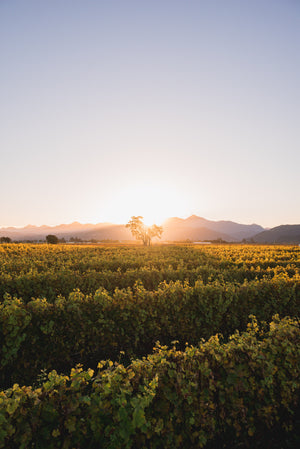Since an early age, Saint Clair red winemaker Kyle Thompson has been fascinated with insects and plants. Slightly bee-witched you could say.

Kyle makes sure the the bees have easy access to and from the hive in the garden at the Saint Clair winery.
So when a swarm of bees decided the worm farm in his backyard was a good spot to setup shop in 2011, it was an easy decision to keep them on. He rang his local beekeeper to help him transfer them to a more suitable accommodation, and he’s been beekeeping ever since.
What Kyle really gets a buzz out of is collecting single floral honeys from targeted flowering plants.
“Each single varietal honey is a bit like a single vineyard wine, very unique with different aromas, characters, and flavours which are unique to the place or plant targeted.”
Currently for example, White Hebe Wiri Mist Hebe Scrophulariaceae are in full bloom at the Saint Clair winery and Kyle has placed a small hive in our garden to target the nectar.
Kyle also collects enough multi-flora honey from his urban hives to supply his family, but leaves enough honey on the hives so the bees can survive the winter.
“The multi-flora honey collected from gardens around town is fantastic, it’s very delicate and aromatic with a long lasting aftertaste reminiscent of perfumed wild flowers.”
“Beekeeping has made me a lot more aware of the environment and seasonal variations, I’m also becoming quite knowledgeable on when certain nectar producing plants are flowering throughout the year.”
Scientific research has shown the powerful medicinal qualities of honey are (ahem) the bee’s knees, including anti-bacterial solutions and properties useful for stomach problems and sports recovery, among other things.
Kyle believes his seasonal hay fever has steadily improved each year from ingesting micro-amounts of pollen found in his home honey.
And bees may also be useful for stress relief: one of Kyle’s favourite things to do is to sit quietly with a glass of wine, watching the bees come and go. “It’s very relaxing.”

This worker bee is collecting pollen in the pollen baskets on the backs of its legs to feed the hive’s larva (rather than collecting nectar for honey).
To bee or not to bee? Kyle’s top tips for aspiring apiarists
- A responsible beekeeper must keep an eye on the hive to ensure it is free of disease, functioning well, that the Queen is in good health and performing her role adequately and no rogue queens are being raised. It’s certainly not a case of getting a hive and letting them do their thing until honey harvest time.
- Kyle recommends reading and re-reading ‘Practical Beekeeping in New Zealand – The Definitive Guide’ by Andrew Matheson and Murray Reid – a veritable bible for anyone considering getting backyard bees in New Zealand.
- Hives must be registered and inspected for disease every year.
Bee-lieve it or not
Bees are nature’s barometer – when rain is coming, they’ll head back to the hive for shelter, Kyle says. “You’ll see the bees all rushing back to the hive, and I’ll be thinking nah, this is going to blow over, but next thing it starts raining – they really are incredible.”
The post Saint Clair Winemaker Creates a Buzz appeared first on Saint Clair Family Estate.


